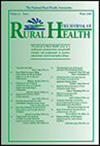Geographic disparities in unpaid caregiving
Abstract
Purpose
An updated, nationally representative examination of rural–urban differences in the experiences, health, and well-being of caregivers is needed; previous research on this topic uses older data or has limited generalizability. This study examines rural–urban differences in the characteristics, experiences, and health of caregivers.
Methods
The 2021–2022 Behavioral Risk Factor Surveillance System (n = 44,274 unpaid caregivers) was used, with rurality defined according to the 2013 National Center for Health Statistics (NCHS) Urban-Rural Classification Scheme. Chi-square tests compared rural–urban differences in these caregivers’ characteristics, including demographic factors, caregiving intensity (e.g., weekly hours spent caregiving, reason for caregiving, past-month ADL/IADL assistance), caregiver's health (e.g., general health status and past month physical health, mental health, and limited activity), and caregiver's health behavior (chronic illness, smoking status, binge drinking, and annual checkups).
Findings
Compared to urban caregivers, rural caregivers were more likely to have at least one chronic condition (58.3% vs. 53.2%; p < 0.0001), be obese (42.9% vs. 37.5%; p < 0.0001), be a smoker (24.2% vs. 15.5%; p < 0.0001), and less likely to be a binge drinker (12.7% vs. 15.3%; p = 0.003). Compared to urban caregivers, rural caregivers were more likely to report their general health status as fair/poor (20.3% vs. 17.0%, p = 0.0003) and were more likely to report 14 or more days of poor physical health in the past month (15.6% vs. 12.0%, p < 0.0001).
Conclusions
Understanding geographic disparities in the experiences and context of unpaid caregiving is needed to improve their overall well-being and health. Future research will be necessary to determine factors associated with these outcomes.

 求助内容:
求助内容: 应助结果提醒方式:
应助结果提醒方式:


